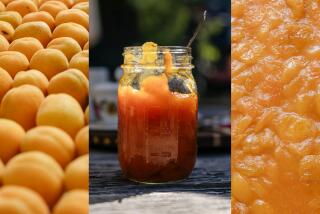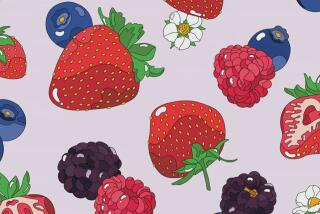Irene Hawes: The Fairest of Them All
- Share via
Most county fair bakers enter no more than four or five categories--baked goods don’t keep and entrants often bring their cakes and breads and cookies still warm from their ovens. But a preserved foods exhibitor can enter scores and scores of categories, and the prodigy of preserved foods is Irene Hawes of Ontario. This year she entered close to 100 of the 155 categories.
She doesn’t just enter; she usually wins. This year she took 38 blue ribbons, making her the sweepstakes winner for the 13th time in her 26-year career. When pressed to pick her specialty, she settles on her watermelon pickles.
Tradition is involved in this degree of expertise, of course. “My mother always canned--she had to,” Hawes says. “When I got married I started canning, just like I thought I had to. I canned everything I could get a hold of and it just stayed with me all these years.”
Hawes’ family, originally from the South, moved to Chino when she was 4, and she and her husband have lived in the same house in Ontario for 46 years. “I grew up in Chino,” Hawes says, “I went to the Chino schools. There wasn’t so much to do in those days, and we really looked forward to going to the fair.”
Oddly, though, when it comes to entering the fair, she’s actually following in her own daughter’s footsteps. Her daughter competed as a teen-ager, and it was only after she stopped entering that Hawes started.
In past years her husband got in the act too and entered his whole-wheat and white rolls in the baking competition. “He did real well,” Hawes says. These days, though, he sticks to non-competition chocolate chip cookies: “If we bake it, we eat it,” Hawes says, meaning that neither she nor her husband bake for prizes.
But for a long time, Hawes entered not just the preserved foods competition, but baking and table-setting too. She gave up the baking contests 15 years ago. “I did pretty good,” she says, “but it was just too hard to do both the baking and preserves. I was working and trying to do the table-setting . . . it was too much.”
Anyway, Hawes says, “canning is my main thing.” She ordinarily does well in table-setting--this year she entered a Thanksgiving setting--but, she says, “there’s a lot of competition. See, I’m older now, and all these young girls, they really haul a lot out to the fair--they just have a lot of energy. I’m glad to see that.”
In canning, however, she has a major advantage over a lot of contestants--fresh, ripe produce to work with. She and her husband grow their own apricots, plums, peaches and tomatoes and get cherries from her brothers. But even she has to use market produce sometimes, when she wants to enter something she doesn’t grow or when she has bad luck in her garden.
“It’s hard to get good fruit in the stores,” she says. “The fruit in Southern California is just not like it used to be. Pears are still good, but apricots are getting worse. I don’t know where people who enter the fair are going to get their fruit in a few years--unless they have their own trees.”
And this is one category where it’s a little harder to get the younger generation involved. “Not every woman has the facilities to do what I do,” Hawes says. “So many women are working today--they don’t have time to make jelly or can pears and peaches. But I think it’s still worthwhile. When you can something, you know what you’re eating. When you get a jar of raspberry jelly somewhere else, it’s expensive and you don’t know what went in it.”
When the fair is over, she’ll start work for next year’s fair. For this, she has a capacious basement, amounting to one quarter of the house. “There are too many jars down there to count,” Hawes says. And she has another piece of good fortune: her husband, Elwin. He takes good care of the fruit trees, he helps pack and transport her jars to the fairgrounds and, best of all, Hawes says, “he washes the jars.”


